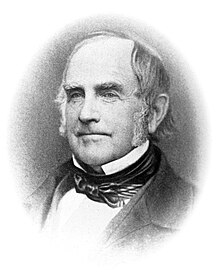Philip Allen
Philip Allen (born September 1, 1785 in Providence , Rhode Island , † December 16, 1865 ibid) was an American politician and from 1851 to 1853 governor of the state of Rhode Island. Between 1853 and 1859 he represented his state in the US Senate .
Early years
Philip Allen initially enjoyed a private education and then attended Taunton Academy and the Robert Rogers School in Newport . He then studied until 1803 at Rhode Island College , now Brown University . He then became a businessman in his father's company, which was involved in foreign trade, among other things. When this came to a standstill during the British-American War of 1812 due to military measures, Allen switched to the production of clothing items from cotton.
Political rise
Philip Allen was a member of the House of Representatives from Rhode Island between 1819 and 1821 . After that he was employed by the Pension Agent . In 1827 he became president of the United States Bank's Rhode Island branch . In between he was still busy making clothes. He also worked in Providence in calico printing. Politically, he became a member of the Democratic Party founded by Andrew Jackson , as its candidate he was elected governor of his state in 1851.
Governor and US Senator
Allen took office on May 6, 1851. He was re-elected in 1852 and 1853. During this period, the death penalty was abolished in Rhode Island . The background was the execution of a death sentence on an innocent person. After he was elected to succeed John Hopkins Clarke to the US Senator, he stepped down from the office of governor. In Washington he represented the interests of his state between July 20, 1853 and March 3, 1859. During this time he was chairman of the Agriculture Committee. After the end of the legislative period, Allen decided not to run again.
Another résumé
After his time in Washington ended, Allen retired from politics and business. He died in December 1865. He and his wife Phoebe Aborn had eleven children. It is also noteworthy that Philip Allen was an uncle of Thomas Dorr , who led a rebellion in Rhode Island between 1842 and 1843 and was convicted of high treason, but was later pardoned.
literature
- Robert Sobel and John Raimo (Eds.): Biographical Directory of the Governors of the United States, 1789–1978. Volume 4, Meckler Books, Westport, 1978. 4 volumes.
Web links
- Philip Allen in the National Governors Association (English)
- Philip Allen in the Biographical Directory of the United States Congress (English)
- Philip Allen in the database of Find a Grave (English)
| personal data | |
|---|---|
| SURNAME | Allen, Philip |
| BRIEF DESCRIPTION | American politician |
| DATE OF BIRTH | September 1, 1785 |
| PLACE OF BIRTH | Providence , Rhode Island |
| DATE OF DEATH | December 16, 1865 |
| Place of death | Providence , Rhode Island |


